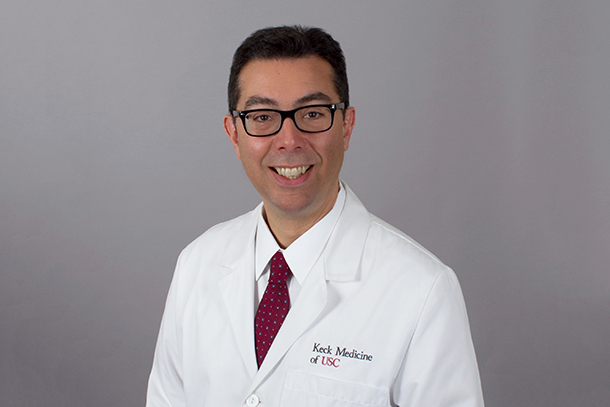John S. Oghalai, MD, chair and professor of otolaryngology – head and neck surgery, joined the Keck School of Medicine of USC on Aug. 1 from Stanford University School of Medicine. He specializes in caring for patients with diseases of the ear and skull base. He recently spoke with HSC News about his background and what his plans are for the department.
Why did you choose otolaryngology?
I love the mix of surgery and clinical care found in otolaryngology and head and neck surgery. The anatomy of the head and neck is incredibly complex, and this makes the surgery quite delicate and beautiful. Most importantly, so much of what we take in around us through our senses comes through the head and neck region; it is literally how we experience and survive in the world. Diseases of the head and neck greatly affect our ability to experience life, so the care that an otolaryngologist provides is often quite meaningful to our patients. We form a special bond with our patients and I enjoy this aspect of the specialty.
You have an extensive research portfolio. What projects will you be working on at the Keck School? What advances do you think are possible in otolaryngology research?
I think we are on the cusp of a transformational change in how we manage patients with hearing loss, and this is what my research focuses on. Advances in our understanding of biological development and regeneration and in electronics, technology and signal processing mean that we will soon be able to recreate normal hearing in hearing-impaired patients. This will be a major improvement over the exciting, but less than perfect, state-of-the-art hearing aid and cochlear implant approaches. My hope is that age-related hearing loss, which occurs in just about everybody, can be easily overcome with simple external electronic devices and that early-onset and genetic progressive hearing loss can be stopped before it reaches the point where a cochlear implant is necessary.
What is something you think people should know about otolaryngology that might be a surprise to learn?
Unfortunately, there are many diseases in our specialty that we understand and manage, but cannot cure with modern medicine. Hearing loss is probably the most common one. One might think that hearing aids compensate for hearing loss, but in fact, they make sounds louder but they don’t make words clearer and easier to understand. This is the key issue that I believe research will be able to overcome in the near future.
Why did you choose the Keck School?
This school is on the verge of a major jump in its academic rankings. It is part of an incredible university that has seen remarkable changes in many other schools, and these advances are now occurring at the Keck School. Furthermore, Keck Medicine of USC is located in the middle of a vast patient base. This means that translational research to bring novel treatments to patients is not only possible here, but relatively easy. I think that testing new treatments in patients is where the excitement is and I am thrilled to be able to help lead this effort.
The Keck School has been involved in a yearlong strategic plan initiative. The vision statement that come from the strategic plan is: Keck School of Medicine converges the strengths of USC, driving innovation in health and medicine to serve our diverse communities. Do you see any opportunities to collaborate with other departments within the Keck School or with other schools within USC (e.g. cinematic arts, education, engineering, etc.)?
Absolutely. Given that we sense and communicate with the world through the head and neck, the humanities are particularly relevant. For example, collaborative innovations through the USC Thornton School of Music and the USC School of Cinematic Arts can help to improve the care of the professional voice. Working with the USC Rossier School of Education is a high priority because of the Caruso Family Center, a center within our department that provides hearing and educational services for hearing-impaired children. Finally, the USC Viterbi School of Engineering will be a critical collaborative partner because signal processing strategies, electrical-biological interfaces and simplified yet meaningful software interfaces are the key to taking advantage of novel advances in electronics and artificial intelligence. There are so many ways this could play out, for example virtual reality training exercises for patients with facial paralysis, children with speech delays, or older patients with disequilibrium.
What are your plans for the department?
The USC Tina and Rick Caruso Department of Otolaryngology – Head and Neck Surgery is strong, but we can improve further. A key goal is to expand basic and translational research in all subspecialty areas. Clinical services also will be grown to accommodate the increasing need for subspecialty otolaryngology care in Los Angeles. We will enhance our strong educational programs for otolaryngology residents and for medical students.


